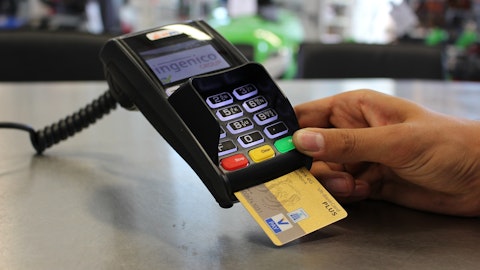Bruce Lowthers: Yes, so just to kind of level-set, when you had eCash as a business last year in ’22, it had declined 3% from ’21. ’21, if you look back, eCash was in essence a prepaid business which usually does very well in recessionary time frames, or time frames such as COVID as you were hitting ’20 and ’21, so we had a significant amount of growth in 2012. We knew that that was–back then, we knew that that kind of growth profile was not a sustainable growth profile, so you saw it pull back in ’22 and you’re seeing it improve from a minus-3% to a 1% year-to-date in ’23, so while we’re moving it back in the right direction, those businesses typically, in my experience at least, have really kind of always gravitated around mid single digit growth profiles.
Scott Wurtzel: Got it. Appreciate it, thank you.
Operator: Thank you. The next question is coming from Friedman from Susquehanna. Your line is now live.
Bruce Lowthers: Good morning Jamie.
Jamie Friedman: Good morning. Nice improvement here. I wanted to ask first about your call-out, Bruce, about the acceleration in boarding new merchants. Bear with me – I’m just trying to find the page.
Bruce Lowthers: Yes, I think it was Page 9–
Jamie Friedman: Oh, I’ve got it – sorry, no, it was Page 4. When you’re saying that the merchant, you expedited it 10 days and that’s versus May ’23, and that’s 14%, I’m embarrassed to say I’ve never heard that metric before. It sounds important. I’m just wondering operationally, how it is that you’ve been able to deliver that and what it may mean in terms of your financial results.
Bruce Lowthers: Yes Jamie, great question. One of the things that we’ve talked a lot about this year is around operational excellence, and as Alex mentioned a little bit earlier, when you looked at our company going back a year, what we had was a series of organizations kind of operating independently. Those things created some inefficiencies within our organization, and what we’ve really tried to do here is get after the business processes and the technology stacks that allow us to accelerate our revenue streams. When we look at this 10-day example, it’s just another example of how we’re focusing on improving the business processes that we have to accelerate our time to revenue. I think we talked about in the earnings–sorry, in the analyst day that we did, we talked about time to market for our enterprise deals being close to nine months, and trying to drive that down from 270 days down to 58 days, just in a couple months, so a lot of positive movement on process review and what we’re doing.
Jamie Friedman: Okay, great. Then Bruce, if I could follow-up with just a higher level question which we get–
Bruce Lowthers: Sure.
Jamie Friedman: How would you compare the competitive position of merchant solutions versus digital wallets? I know it’s a very hard thing to answer because the denominator, the market environment for both is different, but it looks like merchant is doing about, if not better than the market. Wallet, I know is a very competitive world, but just at a high level, how would you compare the positioning of both those big products for you?
Bruce Lowthers: Yes, look – I see on the merchant side, we’ve got a very competitive product. We see strong growth in our SMB space. Certainly we resell some other products, like Clover, we’ve had strong 20% growth in sales of Clover. Our ecomm component of the merchant is also very competitive in the verticals that we’re in, so what we’re really trying to do is own the spaces that we play in. We’re not trying to go upstream and go after ecomm for Apple or Amazon. We’re trying to stay in the verticals that we play in and that we have a tremendous amount of domain expertise. That’s really worked for us and it’s allowed us to really re-accelerate the growth engine on merchant acquiring. I think when you look on the wallet side, we feel very good about what we do with the wallet.
Again, I think the platform itself, as we start moving into the non-branded or white label wallet component of the wallet platform, we feel like there’s a tremendous amount of opportunity because of the regulatory compliance things, the fraud management that we’re exceptional at. We really feel like we compete very well. Again, in our wallet space, we are trying to really focus on owning a couple of verticals that we play exceptionally well in – the gaming space, the gambling space. What we’re not trying to become is just a horizontal wallet that competes necessarily with Apple or some of the other more horizontal brands.
Jamie Friedman: Got it, thanks for that. I’ll drop back in the queue.
Bruce Lowthers: Thank you Jamie.
Operator: As a reminder, that’s star, one to be placed into question queue. Our next question is coming from Tim Chiodo from UBS. Your line is now live.
Tim Chiodo: Great, thanks a lot. I wanted to ask about the competitive environment in the North American iGaming ecommerce or online market. Braintree, clearly a large competitor in overall ecommerce merchant acquiring, and knew they had made some public comments in the past about seeing them in that space, are you running into them much? How much of a competitor are they to your online processing or merchant acquiring capabilities in that space?



